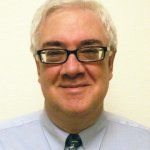Treating Anal Cancer Precursor Lesions Reduces Cancer Risk for People With HIV
Groundbreaking National Clinical Trial Halted Due to Therapy’s High Success Rates
Treating precursor anal cancer lesions can significantly reduce the risk of progression to full blown anal cancer among people living with HIV, according to results of a large, phase 3 study led by researchers at UC San Francisco.
In a randomized clinical trial with 4,446 participants, known as the Anal Cancer/HSIL Outcomes Research (ANCHOR) study, researchers found that by removing high-grade squamous intraepithelial lesions (HSIL), chances of progression to anal cancer were significantly reduced.
The trial is the first to show such findings and was performed at 21 clinical sites around the United States. Results are being prepared for peer-reviewed publication and are being shared now because of the public health importance of the findings.
The study caps decades of research into the history, prevention and treatment of anal cancer and its precursors. It also provides important information for developing standard of care guidelines for people at high risk of anal cancer, including screening for and treatment of anal HSIL, said lead investigator Joel Palefsky, MD, a professor of Medicine at UCSF.
“ANCHOR data show for the first time that, like cervical cancer, anal cancer can be prevented even in high-risk populations, such as people living with HIV, who often have HSIL that can be difficult to treat,” Palefsky said. “Although the study was performed in people living with HIV, the results suggest that anal cancer prevention could be similarly possible in other groups known to be at increased risk of anal cancer, including women with a history of vulvar or cervical cancer, men who have sex with men who are HIV-negative, and men and women who have immunosuppression for reasons other than HIV infection.”

Joel Palefsky, UCSF professor of Medicine
Palefsky established the world’s first clinic devoted to anal cancer prevention in 1991 at UCSF. Now known as the UCSF Anal Neoplasia Clinic Research and Education Center, it is currently based at the UCSF Medical Center at Mount Zion in San Francisco.
In the study, people living with HIV aged 35 years and older who had the precursor lesion were randomized into two groups: treatment of the lesion or active monitoring of the lesion without treatment.
Most often, treatment consisted of a technique performed in physician offices called hyfrecation (electrocautery), in which an electric current was targeted directly to areas of the HSIL to remove them. Participants were re-evaluated every three to six months, and rates of anal cancer were compared between the two groups.
The incidence of anal cancer is very high among people with HIV and is similar to cervical cancer: both have a strong association with human papillomavirus and are preceded by HSIL.
Cervical cancer prevention programs to find and treat cervical HSIL are the standard of care and highly effective in reducing the risk of developing cervical cancer. The investigators noted that the principal reason to consider HSIL treatment is to reduce the risk of developing anal cancer. The ANCHOR study will provide key information in guiding recommendations to make anal cancer prevention programs the standard of care for people at high risk of anal cancer.
The study was conducted through the National Cancer Institute’s (NCI’s) AIDS Malignancy Consortium, led by Palefsky and his team at UCSF. The University of Arkansas for Medical Sciences provided statistical support and contract research organization support was provided by The Emmes Company LLC.
Funding: The trial was sponsored by the National Cancer Institute’s Office of HIV and AIDS Malignancy (Grant number U01 CA121947.
About UCSF Health: UCSF Health is recognized worldwide for its innovative patient care, reflecting the latest medical knowledge, advanced technologies and pioneering research. It includes the flagship UCSF Medical Center, which is ranked among the top 10 hospitals nationwide, as well as UCSF Benioff Children’s Hospitals, with campuses in San Francisco and Oakland, Langley Porter Psychiatric Hospital and Clinics, UCSF Benioff Children’s Physicians and the UCSF Faculty Practice. These hospitals serve as the academic medical center of the University of California, San Francisco, which is world-renowned for its graduate-level health sciences education and biomedical research. UCSF Health has affiliations with hospitals and health organizations throughout the Bay Area. Visit http://www.ucsfhealth.org/.
About the AIDS Malignancy Consortium: AMC is a membership-based scientific organization supported by the National Cancer Institute, part of the National Institutes of Health, that designs and conducts cancer research among PLWH who have or are at risk of developing cancer. For more information please visit www.amcoperations.com.